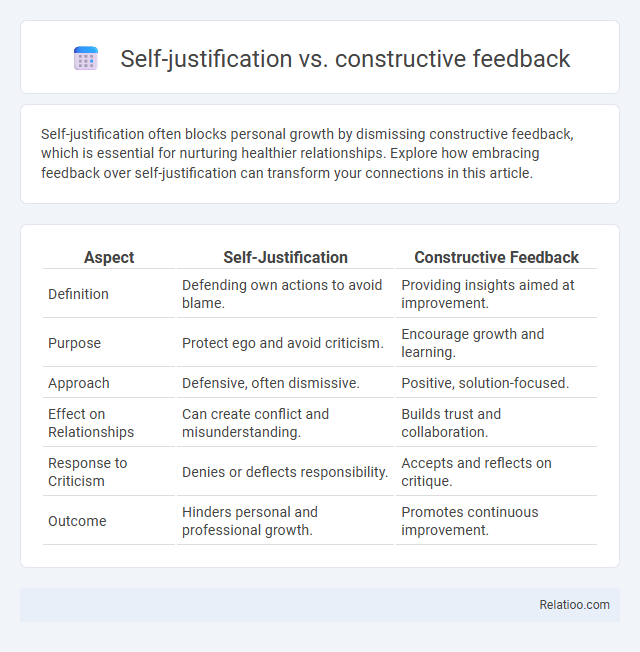Self-justification often blocks personal growth by dismissing constructive feedback, which is essential for nurturing healthier relationships. Explore how embracing feedback over self-justification can transform your connections in this article.
Table of Comparison
| Aspect | Self-Justification | Constructive Feedback |
|---|---|---|
| Definition | Defending own actions to avoid blame. | Providing insights aimed at improvement. |
| Purpose | Protect ego and avoid criticism. | Encourage growth and learning. |
| Approach | Defensive, often dismissive. | Positive, solution-focused. |
| Effect on Relationships | Can create conflict and misunderstanding. | Builds trust and collaboration. |
| Response to Criticism | Denies or deflects responsibility. | Accepts and reflects on critique. |
| Outcome | Hinders personal and professional growth. | Promotes continuous improvement. |
Understanding Self-Justification: Definition and Examples
Self-justification involves defending your actions or decisions by rationalizing them to avoid admitting mistakes, often hindering personal growth and objective learning. Unlike constructive feedback, which provides actionable insights aimed at improvement, self-justification maintains a biased perspective that can block acceptance of external input. Understanding self-justification is crucial for recognizing when your mindset shifts towards defensiveness, preventing you from fully benefiting from helpful critiques.
What is Constructive Feedback? Key Principles
Constructive feedback is a communication process aimed at helping individuals improve performance by providing specific, actionable, and balanced insights focused on behaviors rather than personal attributes. Key principles include clarity, specificity, and a focus on future improvement, ensuring the feedback is delivered respectfully and encourages open dialogue. Unlike self-justification, which centers on defending one's actions, constructive feedback promotes growth by fostering understanding and collaboration.
Psychological Roots of Self-Justification
Self-justification originates from cognitive dissonance, where Your mind seeks to resolve conflicting beliefs by rationalizing actions to protect self-esteem. Constructive feedback focuses on objective improvement and growth, contrasting with self-justification that often defends past behavior instead of embracing change. Understanding the psychological roots of self-justification helps differentiate defensive reasoning from genuine learning and progress.
The Impact of Self-Justification on Personal Growth
Self-justification often hinders personal growth by creating cognitive biases that prevent you from accepting constructive feedback objectively. When you prioritize defending your actions over understanding mistakes, opportunities for learning and development diminish, leading to stagnation. Embracing constructive feedback instead fosters self-awareness, resilience, and meaningful progress.
Benefits of Embracing Constructive Feedback
Embracing constructive feedback fosters personal and professional growth by providing clear, actionable insights that help improve skills and performance. Unlike self-justification, which may hinder learning by defending mistakes, accepting feedback encourages a growth mindset and continuous development. Your openness to constructive criticism cultivates resilience and adaptability, essential traits for success in any environment.
Common Triggers for Defensive Self-Justification
Common triggers for defensive self-justification include criticism, perceived threats to self-esteem, and feedback that challenges your beliefs or actions. Constructive feedback aims to foster growth by highlighting areas for improvement without triggering defensiveness, while self-justification often arises as a coping mechanism to protect one's self-image. Recognizing these triggers can help you respond more openly and develop a healthier communication dynamic.
Strategies to Shift from Justification to Receptiveness
Shifting from self-justification to receptiveness involves adopting a mindset focused on growth and open communication. Your strategy should include actively listening to constructive feedback without defensiveness and reframing criticism as an opportunity for improvement. Embracing vulnerability and asking clarifying questions also help cultivate a more receptive approach to feedback, enhancing personal and professional development.
The Role of Mindset in Receiving Feedback
Your mindset profoundly influences how you interpret feedback, with a fixed mindset often leading to self-justification as a defense mechanism against criticism. Embracing a growth mindset fosters constructive feedback reception by encouraging learning and improvement rather than denial or excuse-making. Developing awareness of this dynamic enables you to shift from self-justification toward using feedback as a valuable tool for personal and professional growth.
Building a Feedback-Friendly Culture
Building a feedback-friendly culture hinges on shifting from self-justification to embracing constructive feedback, enabling you to foster open communication and continuous improvement. Constructive feedback centers on specific, actionable insights that help individuals grow, whereas self-justification often blocks learning by rationalizing mistakes. Prioritizing a safe, trust-based environment encourages acceptance of feedback and diminishes defensive responses, promoting collective development.
Practical Tips for Giving and Receiving Constructive Feedback
Effective communication in the workplace hinges on distinguishing self-justification from constructive feedback, allowing you to foster growth and improvement. When giving feedback, focus on specific behaviors, offer actionable suggestions, and maintain an objective tone to avoid triggering defensiveness. Receiving feedback with an open mindset enables reflection and development, transforming critiques into opportunities rather than self-defensive reactions.

Infographic: Self-justification vs Constructive feedback
 relatioo.com
relatioo.com